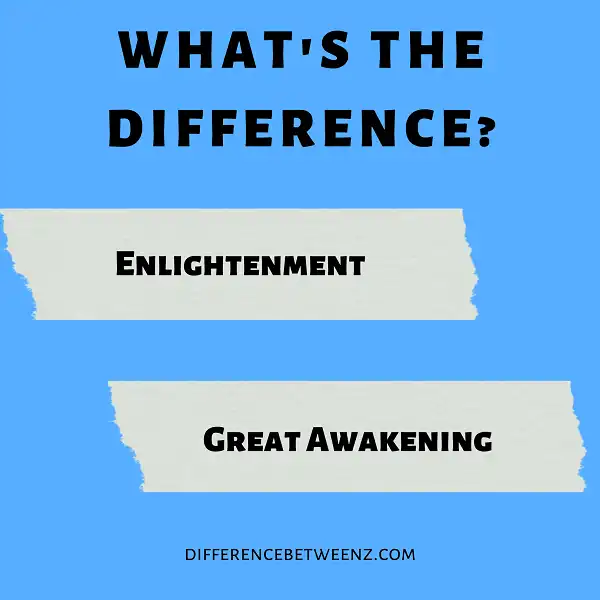Throughout Europe and the Americas, two major social and intellectual movements occurred within the 17th-18th century. These were known as The Enlightenment, also referred to as The Age of Reason, and The Great Awakening. While each movement had its own unique characteristics in terms of philosophy, attitudes toward religion, and even political thought, there are key distinctions that must be made between them pertaining to origins, objectives, and implications. In this blog post, we will explore how these two eras differ from one another by taking a deeper look into their theological message along with other defining elements.
What is Enlightenment?
- The Enlightenment was a cultural movement that began during the Enlightenment era in Europe (c. 1750-1820), characterized by an emphasis on reason, science, and individualism. Enlightenment thinkers sought to apply rational thought and scientific progress to issues of morality and ethics, as well as criticize traditional beliefs.
- Enlightenment thinkers championed free will and self-expression, believing that an individual should value their own thoughts and opinions rather than having them dictated by oppressive regimes or forces of authority.
- Enlightenment ideas spread quickly across Europe and beyond, creating new movements that challenged the status quo of religious norms. Ultimately, the Enlightenment broadly shaped modern ideas about democracy, freedom, religion, art, and culture for centuries to come.
What is the Great Awakening?
- The Great Awakening was a religious revolution in 18th-century America characterized by revivalism, as people of all social classes experienced an unprecedented outpouring of religious feelings. This movement began with several evangelical awakenings or regional surges in religious activity and eventually spread throughout much of the colonies.
- It challenged traditional authority within religious communities, emphasizing individual and personal expressions of faith rather than respect for established practices and institutions.
- The Great Awakening also inspired the nation to focus on social reform, leading to a period of political activism that ultimately contributed to the American Revolution. This significant period was marked by impassioned discussions about spiritual themes, inspiring many colonial Americans to examine deeply their own beliefs and values.
Difference Between Enlightenment and Great Awakening
The Enlightenment and the Great Awakening were two pivotal spiritual and intellectual movements of the 18th and early 19th centuries.
- The Enlightenment began in Europe and focused on reason, science, and individualism as a means of progress.
- During this time, Enlightenment thinkers wrote about the value of human rights, natural laws, and religious toleration.
- The Great Awakening, on the other hand, was a religious revival movement that swept across North America in the mid-1700s.
- This spiritual awakening focused on challenging old ways of thinking and encouraged people to read scripture for themselves instead of relying solely on what church leaders told them.
While both Enlightenment thinkers and Great Awakeners sought to revolutionize intellectual thought at the time, their approaches were drastically different: Enlightenment thinkers stressed reason while Great Awakeners embraced the faith.
Conclusion
The Enlightenment and the Great Awakening were two historical periods with different approaches to religion, science, and society. The enlightenment was focused on reason and individualism while the Great Awakening was about emotions and community. There are many similarities between these two periods, but they also have some key differences. Understanding the difference between the Enlightenment and the Great Awakening can help you better understand both movements and their impact on history.


